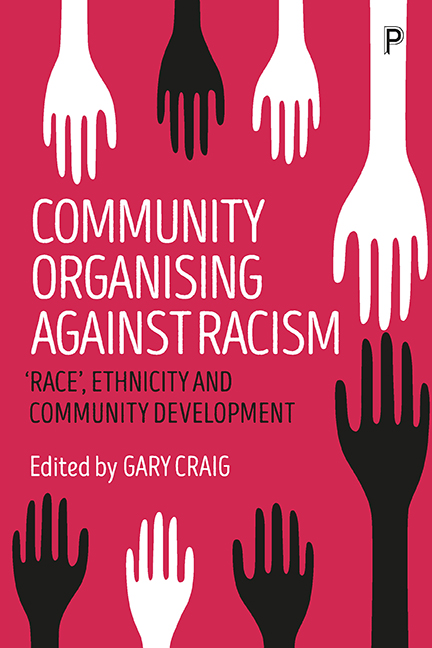Book contents
- Frontmatter
- Dedication
- Contents
- List of figures
- Author biographies
- List of abbreviations
- Introduction
- Section One Community development with ethnic minorities: history, theory, policy
- Section Two Building capacity with BME groups
- Section Three Working with Roma communities
- Section Four Global experience
- Section Five Working across cultural boundaries: ideological and personal reflections
- Afterword: Messages for community development in working with minority groups
- Index
Four - Learning alliance approaches to working with BME communities on healthcare innovation: a case study in palliative and end-of-life care services
Published online by Cambridge University Press: 12 April 2022
- Frontmatter
- Dedication
- Contents
- List of figures
- Author biographies
- List of abbreviations
- Introduction
- Section One Community development with ethnic minorities: history, theory, policy
- Section Two Building capacity with BME groups
- Section Three Working with Roma communities
- Section Four Global experience
- Section Five Working across cultural boundaries: ideological and personal reflections
- Afterword: Messages for community development in working with minority groups
- Index
Summary
Introduction
In 2015 the Economist Intelligence Unit ranked the UK first in its 2015 Quality of Death Index, citing a combination of factors. These include comprehensive policies at the national level; the integration of palliative care into the National Health Service (NHS); subsidies that provide long-term funding for hospices and specialised units; the provision of educational and specialist courses; transparency; and a commitment to community engagement that, the report notes ‘is central to the NHS model’ (Economist Intelligence Unit, 2015, p 75). Despite the UK's ranking as the ‘best place in the world to die’, significant inequalities in accessing and using palliative and end-of-life (EoL) care services still remain, and promoting an ‘equality led approach’ and delivering ‘equitable end of life care’ has become an objective of health providers (Care Quality Commission, 2016, p 7). The increasing centrality of community engagement, alongside the contemporary concern with addressing inequalities in health service provision towards the end of life provides the background from which the project discussed in this chapter evolved. More specifically, the chapter will discuss and evaluate the use of a learning alliance (LA) as a methodology for community engagement and capacity building through a case study examining the use of, and attitudes towards, palliative and EoL care services among BME groups in North and Mid-Kent in the United Kingdom. The LA consisted of researchers from the University of Greenwich in South East London; local healthcare and palliative service providers; healthcare and specialist palliative and EoL care professionals; BME community groups and individual members from various BME groups.
The LA methodology emerged following increasing criticism of the limited application of much ‘traditional’ academic enquiry, with its hierarchical and sequential mode of knowledge creation and dissemination. Among the various definitions in the literature on LAs, is a common element: the centrality of inter-organisational learning and sharing of knowledge (Oliver and Kalish, 2012). Organisations are generally ‘boundedly rational’, utilising past experience and accumulated knowledge when making strategic decisions and developing policy (Yang et al, 2011). Clutterbuck (1998) argues that LAs are essentially vehicles for tapping into and sharing that accumulated knowledge and are characterised by their proactive nature and commitment to dissolving the gap between research and practice.
- Type
- Chapter
- Information
- Community Organising against Racism'Race', Ethnicity and Community Development, pp. 81 - 96Publisher: Bristol University PressPrint publication year: 2017

